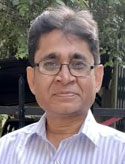Poets And Writers Must Also Retire

By
Sumit Paul, New Age Islam
28 October
2023
"I've lost my writing zeal and will
Let me bid adieu to my quill”.
Robert
Browning to Elizabeth Barrett Browning
"Subakdosh
Kyon Nahin Hote 'Faraz’?/ Takhleeqi Ka Ye Aakhri Marhala Hai "
(Why don't you retire 'Faraz’? / You're in the
final stage of your creativity). The late Urdu poet Ahmad Faraz rightly said
this.
A few days
ago, a Pakistani editor friend of mine, who edits a premier Urdu daily, wrote
to me, "Aapko Nahin Lagta, Iss Shayar Ko Ab Apni Qalam Par Raham Karna
Chahiye? " (Don't you think, this poet should stop bothering his
quill?).
His
allusion was to an octogenarian Indian poet who's very popular among those
whose sense of poetry is quite pedestrian and who love to share and forward
cheap WhatsApp poetry. I fully agreed with my editor friend.
Poetry is a
matter of intuition and inspiration. This poetic inspiration (Hippocrene or
Pegasus) doesn't last forever. It remains active for a particular time and that
period is called 'Spontaneous influx' (William Hazlitt's phrase). During that
phase, poetic thoughts come to a poet effortlessly. In fact, he doesn't have to
try to write poetry.
If you sit,
think, and then write a poem, it can be poetically correct but will hardly
leave an indelible impression on the readers' mind. Poetry is not just
versification or prosody. There's much more to it.
The honesty
of feelings and the integrity of emotions immortalise a poem. The rules of
rhythm and meters (Bahar in Urdu) are important, but they remain
secondary to the content, which is of utmost importance. And the content should
be wholly spontaneous. To paraphrase the bard of Avon, "Spontaneity, thy
name's poetry."
Poetry goes
in vain if you rack your brain. Once a poet realises that he doesn't get the
ideas naturally, he must stop writing poetry. Unless you've very compelling
reasons to speak out, you must call it a day instead of churning out verse
after verse just for the sake of it.
Remember,
mere words don't constitute a poem. Quoting William Shakespeare once again:
" My words fly up, my thoughts remain below, words without thoughts never
to heaven go " (from Act 3, Scene 3 of Hamlet).
When '
thoughts mingle with ink,' the poet doesn't have to write and rewrite. This is
not just limited to poets. The whole creative process is driven by inspiration,
spontaneity, and natural fluidity. It's an altogether different and
indescribable spell about which Ghalib said, "Aate Hain Ghaib Se Ye
Mazameen Khyaal Mein/ Ghalib, Sareer-Khaama Nawa-E-Sarosh Hai "
(Ghalib, from what unseen source spring these verses of thine? / These jottings
of the pen that art redolent of the divine).
Many
writers lose their grip after experiencing and enjoying a creatively fertile
period. They must stop till that indomitable creative urge emerges again and
guides the pen on paper.
Psychologists
and neuroscientists have found that there are three phases of creativity in a
(creative) person's life. The first one is the shortest but strongest. The
second phase is longer but weaker and the last phase is the weakest and is
often laboured. They advise that a truly great writer, poet, or composer must
stop, once the first phase of creativity gets over. They must be able to read
and realise that the writing is on the wall, and they should put an end to writing
once and for all.
-------
A regular columnist for New Age Islam, Sumit
Paul is a researcher in comparative religions, with special reference to Islam.
He has contributed articles to the world's premier publications in several
languages including Persian.
URL: https://newageislam.com/spiritual-meditations/poets-writers-retire/d/130991
New Age Islam, Islam Online, Islamic Website, African Muslim News, Arab World News, South Asia News, Indian Muslim News, World Muslim News, Women in Islam, Islamic Feminism, Arab Women, Women In Arab, Islamophobia in America, Muslim Women in West, Islam Women and Feminism
